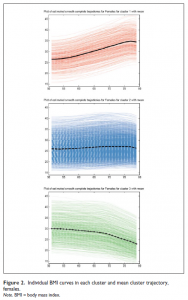Body weight and Health
The obesity paradox is a phenomenon where high body weight is associated with poor health during the life course but paradoxically lower mortality at older ages. Many researchers, including me, suspect that this is because lower body weight at older ages is associated with frailty rather than health but it’s been difficult to show with population survey data.
In a paper published in The Gerontologist a few years ago, my colleagues and I applied a joint generalized growth mixture-proportional hazards survival model and found that weight gain among older adults has little detrimental effects on mortality while weight loss is a powerful predictor of mortality.
Recently, working with brilliant collaborators Snehalata Huzurbazar and Mark Greenwood, we used a powerful nonparametric approach to model BMI trajectories. In a paper published in Journal of Aging and Health,
we applied hierarchical clustering of body weight functions estimated
via the PACE algorithm to determine typical weight trajectories and
their health correlates. This method is completely novel – its
components have recently been developed in statistical journals but it
has never been applied to any substantive questions, whether in
population health or elsewhere. We found that weight loss among older
adults (green weight trajectories) was associated with substantially
worse health outcomes than either being overweight (blue) or even
further gaining weight (red).

